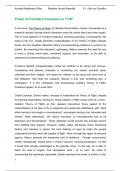Auerello Matthaeus Pillay Reddam House Waterfall 12 – Mrs de Carvalho
Power of Familial Connection in TTOF
In the novel, The Theory of Flight, by Siphiwe Gloria Ndlovu, family is presented as a
powerful concept, through which characters enact the values they have been taught.
This is most apparent in Prudence Ngoma’s nurturing parenting. Consequently, this
leads to her son, Golide Gumede’s materialisation of his Theory of Flight, despite
doubt, and her daughter, Minenhle Tikiti’s uncompromising resistance to protect her
brother. By examining the characters’ upbringing, Ndlovu presents the need for one
to have a strong moral basis, emotional support, and motivation, to be able to
withstand and transcend beyond suffering.
Prudence Ngoma compassionately raises her children to be strong and virtuous.
Considering she believes character is “something you sowed, nurtured, grew,
cultivated and then reaped,” she raises her children “to be proud and never look or
feel defeated.” She finds her husband, “Baines in love with something else, a
contraption.” It is this contraption that foreshadows Golide’s Theory of Flight.
Prudence speaks “to an inner truth.”
Golide Gumede, Genie’s father, chooses to materialise his Theory of Flight, despite
its seeming impossibility. Seeing as “being capable of flight would come at a price,”
Golide’s Theory of Flight, at first, appears impractical. Every aspect of the
materialisation of his plan to fly is expensive and apparently debilitating, with “parts
either having to be bought or manufactured,” and people having to be “educated and
trained.” Most restrictively, “the state’s monopoly on manufacturing had to be
destroyed and decentralised.” These obstacles would prevent the average person
from fulfilling their dreams. However, Golide rather harnesses these restraining
factors and chooses to spend “his time thinking of ways to make the people
understand that they were still capable of flight.” Here, through the vigour of personal
agency, Ndlovu presents the leadership trait of resilience . Though controversial,
Golide “strategically” shoots down a Vickers Viscount, carrying passengers, “so that
it would land virtually undamaged in the guerrilla camp.” In this way, he is able to
teach his race of angels “how aeroplanes work… at no cost.” By virtue of
surmounting the seemingly impossible, Golide exercises the power of choice; in that
1




